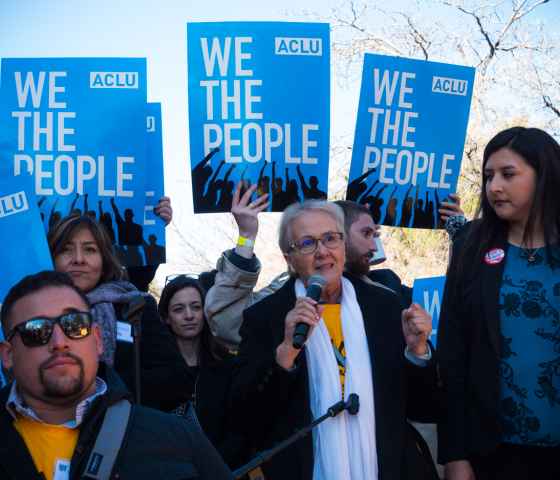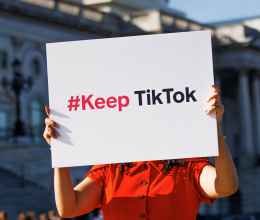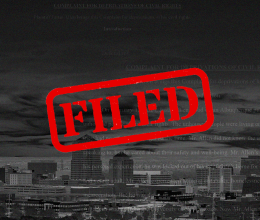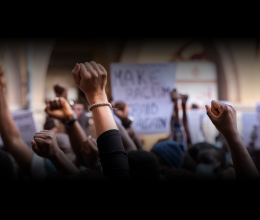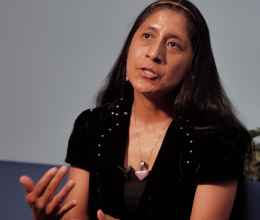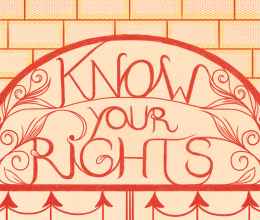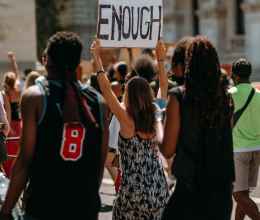John Martin makes a living soliciting donations for bottles of water on the side of the street. Every day he swallows his pride, puts on a smile, and offers the best service he can right now. Not too long ago he was homeless, but thanks to the generosity of strangers and strangers-turned-friends, he and his wife now have a roof over their heads – something he is beyond grateful for as the cold weather moves in. John knows all too well that those donations are all that’s standing between him and the cold hard floor of a tent or a shelter.
“The people who have gotten to know me watched me start out with a shopping cart out there dirty as can be trying to make it. And they watched me go from there to a motel room to getting an apartment,” said John. “Every single day that I wake up, I am grateful for that.”
But lately, John, 49, is more scared than ever of losing his home. The police often harass, intimidate and cite him for bogus violations. According to John, one officer even threatened, “If I weren’t an APD officer, I would kill you.” Another boasted, “See these stripes right here? That means I can do whatever I want.”
A recent ordinance that went into effect on December 6 drastically increases John’s chances of being cited and harassed by the police. Before, officers had to craft disingenuous reasons for citing people like John for exercising their free speech rights from a median or a highway off-ramp. The new ordinance now makes it illegal for anyone to solicit money from motorists at medians or ramps, and for motorists, in turn, to interact with anyone seeking donations in these places. This has the potential to criminalize not just the homeless and the poor, but also anyone raising money for a kids’ football team or firefighters running a “fill the boot” campaign.
John wants a job more than anything, but past non-violent convictions, including time served for drug possession, still loom over his head. Every time he fills out a job application and comes across the question asking if he’s ever been convicted of crime, a sinking feeling sets in. He knows if he checks the box, the phone will never ring.
Despite being jobless and suffering from PTSD and addiction, John never stops fighting to make a better life for himself and his family.
“I go to treatment. I go every day. It’s a lifetime struggle, said John. “I have to find a way to function in this society and I’m having a hard time right now. I want to go back to work.”
Until then, John packs up his water every morning and hits the streets, hoping the police won’t cite him. He can’t afford to pay the tickets and he worries that if they continue to mount, he’ll wind up behind bars again.
Like John, Rhonda Brewer depends on the generosity of Albuquerque residents to get by. She had a home just two and a half years ago, but after her partner physically abused her, she landed on the streets. When she needed the police most, they questioned her claims, saying “I don’t see any marks on you,” and “What did you do to make him do that?”
Now that she’s homeless at sixty-six years old, she panhandles to buy food and to stay a night or two at a motel in between visits to Joy Junction and Road Runner Food Bank.
Though many Albuquerque residents have shown Rhonda kindness, others have treated her with outright cruelty. One man gave her what appeared to be a nicely wrapped sandwich that she was grateful to receive, until she opened it up to discover human feces in-between two slices of bread. Because of callous and inhumane acts like these, Rhonda now prefers to receive either pre-packaged foods or money when possible, so that she can buy her meals food from trusted sources.
While out asking for money, she’s caught the ire of police, who she says have thrown her face-down, handcuffed her, and taken her to jail for panhandling.
“My ex is still stalking me and I can do nothing about it. But if I hold a piece of card board, I’ll get handcuffed, publicly humiliated, and taken to jail or given a ticket,” said Rhonda.
She now suffers from chronic obstructive pulmonary disease and would give anything to get into public housing, where she could safely use the nebulizer she needs, but she knows people who have been on the waiting list for three years. For now, she’s’ making the best out of a dire situation that she worries will be made worse by the new city ordinance.
Mary O’Grady also knows what it’s like to feel scared and ashamed. She wound up living in her car in Austin at just 19, in 1975.
“My family was in great chaos. There was a lot of substance abuse. There was a lot of brutality. And I found myself homeless,” said Mary.
She now holds a master’s degree in Zoology, and has had a successful career in radio and print journalism, but she still remembers the experience of homelessness well, including the struggle to stay clean and find food. That’s why she carries water bottles and pre-packaged string cheese in her car with her every day and hands them out to Albuquerque residents in need. When she visits hotels, she packs up the complimentary toiletries and makes baggies equipped with a disposable razor and wash cloth for homeless people.
“They’re always glad to get them and sometimes if there’s time I tell them at the intersection that I was homeless as a teenager and I wish them good luck and a better life,” said Mary.
Even though it’s been decades since Mary was homeless, she still counts her blessings every time she gets in the bathtub. She hopes that when people see a homeless person, “no matter what kind of physical condition they’re in, they would see a person with potential rather than a disposable person.”
Under the new ordinance, Mary could be cited and arrested for helping people who are just struggling to survive, as she once did.
Though the City insists the new ordinance is intended to protect pedestrians, bicyclists, and motorists, this measure isn’t about public safety; it’s about trying to push poor people out of public spaces. We’re currently planning a legal challenge to the order, just as we successfully challenged a 2003 ordinance that similarly targeted the poor and violated their free speech rights.
The City’s attempt to justify the law based on ‘pedestrian safety’ fools no one,” said María Mártinez Sánchez, Staff Attorney at the ACLU of New Mexico. “This is, undeniably, an ordinance targeted at the poorest in our community. Aside from being unconstitutional the law is simply cruel. It goes into effect right as winter falls upon Albuquerque and smack dab in the middle of the holiday season. It is, quite frankly, a stain on the conscience of our city.”
The ordinance is not only cruel, it does nothing to address the root causes of homelessness and poverty. What Albuquerque needs is more behavioral and social services, not laws that criminalize the poor and send them spiraling further into instability.
At the time of this writing, John has three days to make the remaining $250 for his rent. Recently, he’s had to move from intersections where people know him and support him to evade the cops, weakening his profits. He knows no matter where he goes, they may still find and fine him. If that happens, he’ll have to choose between paying tickets to stay out of jail and paying his rent to stay off the streets. But if he chooses the former, he may well wind up homeless again anyway.
“It took me forever to get from the street to having a roof over my head. I don’t want to lose that. And I don’t know what I’m going to do. I’m terrified,” said John. “I feel like my hands are tied. What do I do now?”
The City says it has a vested interest in adopting laws that promote public safety for all, but the panhandling ordinance only exposes the city’s most vulnerable people to greater harm. We’ll keep fighting until Albuquerque upholds the free speech rights and dignity of everyone in our city.
